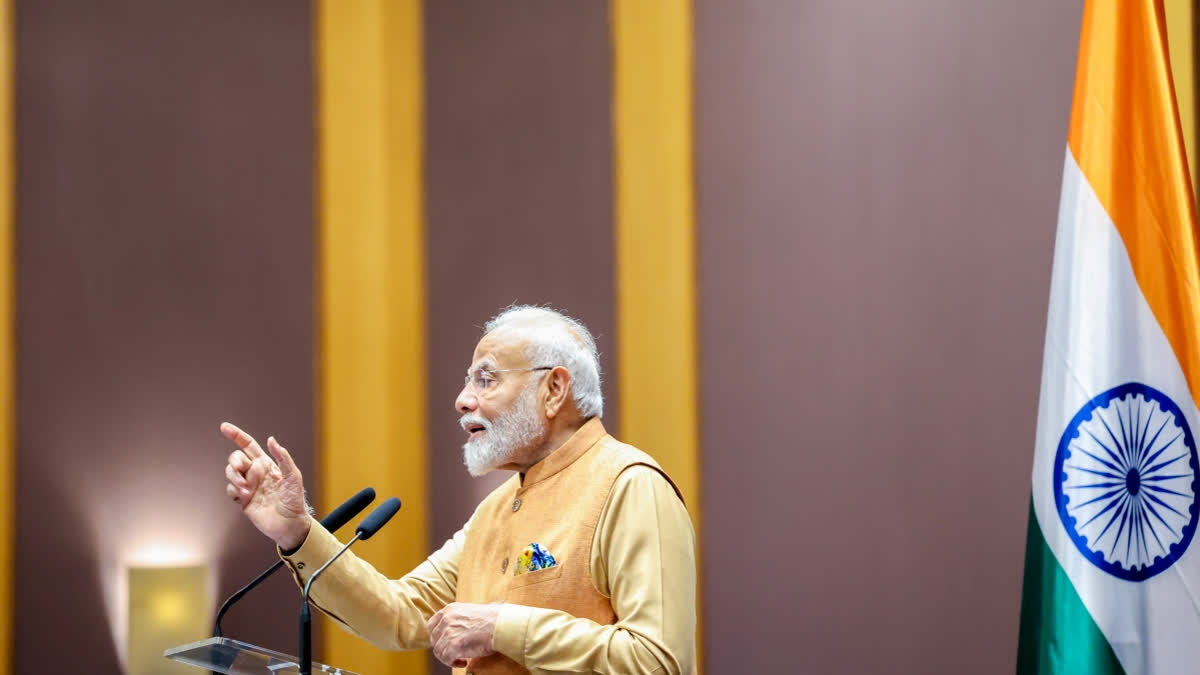New Delhi: Prime Minister Narendra Modi's visit to Poland and Ukraine is taking place at a very critical juncture and it reflects India's balancing act in the complex geopolitical landscape. By engaging with both countries, India aims to strengthen ties while maintaining its stance on the Russia-Ukraine conflict. His visit is carefully watched by the international community. After he visits Poland, it would be interesting to watch PM Modi's visit to Ukraine tomorrow as it is taking place amid the ongoing conflict between Russia and Ukraine, which is indeed a matter of concern for global diplomacy.
The primary agenda of PM Modi's visit to Ukraine includes strengthening ties with Ukraine especially after Kyiv expressed disappointment over his visit to Russia. His visit to Kyiv will set foot for both nations to explore avenues for peaceful resolution of the conflict. The visit will include talks with Ukrainian President Volodymyr Zelenskyy, where discussions are expected to cover a wide range of topics, including agriculture, infrastructure, pharmaceuticals, education, and defence. Most importantly, the ongoing Russia-Ukraine conflict will be a key priority of discussion.
Earlier today, PM Modi expressed concern over the ongoing conflicts in Ukraine and West Asia, reiterating India’s firm belief that no problem can be solved on the battlefield."In any crisis, the loss of lives of innocent people has become the biggest challenge for the whole of humanity. We support dialogue and diplomacy for the early restoration of peace and stability.For this, India, along with its friendly countries, is ready to provide all possible support", he said.
India's direct engagement with Ukrainian leadership demonstrates its commitment to aiding in the search for a peaceful resolution to the conflict and to solidify its position as a major player in Ukraine's post-conflict rebuilding. New Delhi's proactive support for Ukraine's recovery showcases its far-reaching strategic interests in the region.
What does Ukraine expect from PM Modi's visit?
Ukraine recognizes Prime Minister Modi's visit as a crucial opportunity to further strengthen its ties with India, especially in the context of the ongoing conflict. Ukrainian leaders are optimistic that India's involvement could significantly contribute to advancing peace efforts. Additionally, Ukraine is eager to secure India's assistance in revitalizing its war-torn economy. The visit is anticipated to conclude with the signing of several agreements aimed at fostering bilateral cooperation. Nevertheless, the visit follows recent tensions in the India-Ukraine relationship, notably after Ukrainian President Zelenskyy criticized PM Modi's meeting with Russian President Vladimir Putin. Despite this, both nations are committed to moving forward and reinforcing their partnership.
Prime Minister Modi is currently in Warsaw and he met the Polish leadership there. During his meeting with Poland Prime Minister Donald Tusk, the two leaders held talks in restricted and delegation-level formats. Given the salience of India-Poland ties, the leaders decided to upgrade the relationship to a ‘Strategic Partnership’. They engaged in wide-ranging discussions on various aspects of the bilateral partnership, including trade and investment, science and technology, defence and security, cultural cooperation, and people-to-people ties.
The two leaders agreed that there were significant opportunities available for economic and business collaboration in sectors such as food processing, urban infrastructure, water, solid waste management, electric vehicles, green hydrogen, renewable energy, AI, mining and in clean technologies. The leaders underscored the importance of deepening people-to-people ties and cultural relations. In this regard, they highlighted the unique bond established between the two countries based on the generosity of the Maharaja of Jamnagar and the royal family of Kolhapur. They also discussed important regional and global issues of mutual interest including the conflicts in Ukraine and West Asia. They exchanged views on reform of the United Nations and other international institutions, climate change action and threats posed by terrorism. The two leaders underscored that as the world’s two largest democracies, the EU and India have a common interest in ensuring security, prosperity and sustainable development in a multi-polar World They reaffirmed their commitment to deepen India-EU Strategic Partnership, which would not only benefit both sides but also have a far-reaching positive impact globally. After Poland, he will later travel to Kyiv on August 23.
According to the Ministry of External Affairs, this visit to Europe from Poland to Ukraine would be a landmark and historic visit. Most importantly, this is the Prime Minister's first visit to Poland after a gap of 45 years. It is pertinent to note that earlier in 1979, the then PM Moraji Desai had visited Warsaw. The outcome of these visits will shape India's diplomatic growth in the region and will create a place for India as a major player in global peace.
Read More



